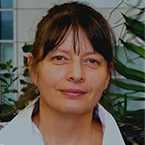
For dissecting the role of intratumor heterogeneity in breast cancer and metastatic disease to develop risk assessment and personalized cancer therapy models and for extensively characterizing the metastatic potential of polyclonal tumors compared to monoclonal tumors.
A cancer research pioneer, Dr. Polyak is celebrated for her contributions to the understanding of intratumor heterogeneity in breast cancer and metastatic disease and for her efforts to develop predictive measures of risk and personalized cancer treatments. Using samples collected from breast cancer patients, her research group has been able to conduct studies that have informed clinical care. Early in her independent career, Dr. Polyak uncovered an early gene loss function of the tumor suppressor HIN1 in over 94% of breast cancers and 95% of preinvasive lesions, caused by a hypermethylation of the gene promoter region. In her groundbreaking publication, Dr. Polyak and colleagues characterized the gene expression profiles of distinct cell lineages, including epithelial, myoepithelial, and stromal cells of normal breast tissue as well as in situ and invasive carcinomas. This work provided crucial insight into the gene expression landscape across distinct cellular lineages and highlighted genetic alterations specific to cancer epithelial cells. Important to the fundamental understanding of cellular proliferation, migration, and invasion, was that these studies also uncovered a role for the chemokines CXCL14 and CXCL12 as these were overexpressed in tumor myoepithelial cells and myofibroblasts.
Dr. Polyak and her research team subsequently developed breast cancer intratumor clonal heterogeneity models that have demonstrated that polyclonal tumors are more likely to metastasize when compared to the same individual clones in monoclonal tumors. Analysis of pre- and post- chemotherapy treatment samples and at different timepoints of disease have revealed that low pre-treatment genetic diversity is a marker for improved treatment response. Her studies have demonstrated the importance of the use of intratumor heterogeneity for risk assessment, with various models developed in her laboratory continuing to reveal novel therapeutic targets for cancer therapy. Most recently, Dr. Polyak’s research has served to demonstrate the interplay between the immune tumor microenvironment and subclonal cell populations in driving cancer metastasis.
Selected Awards and Honors
2022 Elected Member, National Academy of Medicine, Washington, DC
2022 Elected Fellow, National Academy of Sciences, Washington, DC
2019 Elected Fellow, American Association for the Advancement of Science, Washington, DC
2019 Chair, AACR-Waun Ki Hong Award for Outstanding Achievement in Cancer Research
Committee, American Association for Cancer Research, Philadelphia, Pennsylvania
2017 Annual Meeting Program Committee Chair, American Association for Cancer Research, Philadelphia, Pennsylvania
2016 Medical Oncology Discovery Award, Dana- Farber Cancer Institute, Boston, Massachusetts
2016 Rosalind E. Franklin Award for Women in Science, National Cancer Institute, National Institutes of Health, Bethesda, Maryland
2015 Outstanding Investigator Award, National Cancer Institute, National Institutes of Health, Bethesda, Maryland
2012 AACR Outstanding Investigator Award for Breast Cancer Research, American Association for Cancer Research, Philadelphia, Pennsylvania
2011 Paul Marks Prize for Cancer Research, Memorial Sloan Kettering Cancer Center, New York, New York
2010-2013 Board of Directors, American Association for Cancer Research, Philadelphia, Pennsylvania
2008 Elected Member, American Society for Clinical Investigation, Ann Arbor, Michigan
2007 Elected Honorary Member, Hungarian Cancer Society, Budapest, Hungary
2007 AACR Award for Outstanding Achievement in Cancer Research, American Association for Cancer Research, Philadelphia, Pennsylvania
2006 Claire W. And Richard P. Morse Research Award, Dana-Farber, Boston, Massachusetts
2005 Tisch Family Outstanding Achievement Award, Dana-Farber, Boston, Massachusetts